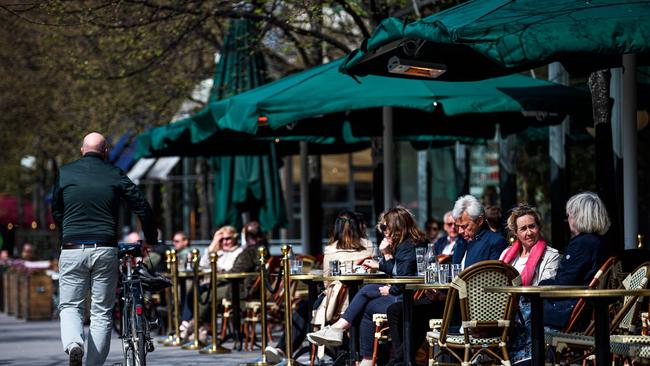Coronavirus: Sweden out in the cold with Europe’s highest death rate
Scandinavia turns its back on Sweden as it records Europe’s highest death rate, raising pressure on PM to impose lockdown.

Sweden is suffering the highest COVID-19 death rate in Europe, raising pressure on the government to abandon its soft approach and impose a lockdown of the kind that has worked elsewhere.
Stefan Lofven, the Social Democrat prime minister, said that the country’s strategy, which encourages people to work from home if they can while schools, restaurants and businesses stay open, will bear fruit in the long run, despite signs that the disease is persisting as it declines on the rest of the continent.
While Sweden was less affected than Britain, Spain and Italy earlier in the epidemic, figures for the past week showed that its deaths per capita have overtaken every other country in Europe, according to Our World In Data, an online research site based in Oxford. Sweden averaged 6.25 deaths a day per million people over the past week. Britain averaged 5.75 deaths a day per million, Belgium 4.6, France 3.49, and Italy 3.
Nearly 4,000 people have died from the virus in Sweden, a figure many times higher per capita than those of its Nordic neighbours Denmark, Norway, and Finland, which all imposed strict lockdown measures. Since the start of the epidemic, 380 Swedes per million have died, compared with 43 in Norway, 96 in Denmark and 55 in Finland, according to the Worldometer website. Sweden has had fewer per capita deaths from coronavirus in total than Britain, Spain, Italy, Belgium and France over the course of the pandemic but the new weekly figures have been devastating.
Concerns about Sweden made the other Nordic countries reluctant to let it join a proposed “travel bubble” among them along the lines of one started last week among the Baltic nations. “Norway, Denmark and Iceland have managed to stabilise their situation, but in Sweden the situation is more alarming,” Maria Ohisalo, the Finnish interior minister, said.
Twenty-two researchers published an appeal in Dagens Nyheter, the Stockholm newspaper, last week accusing the government and the health authorities of aiming to achieve herd immunity without saying so, and calling the policy dangerous and unrealistic.
Mr Lofven has denied that there was any strategy to achieve herd immunity.
He is worried about the image that Sweden is being wrongly cast as the odd one out when its approach would come good over the long haul and the country would suffer less economically and socially than other states. “This fight against COVID-19 is a marathon,” he said.
The prime minister has received strong public support for a strategy that has avoided the severe disruption to life that has been experienced almost everywhere else in Europe.
Sweden has relied on the sense of responsibility of its inhabitants in following advice from the authorities on distancing. Gatherings of more than 50 people are banned. The borders have not been closed but Swedes were told to stay at home and take no holidays until at least July 15.
Testing, which was initially restricted to patients in need of hospital care and medical personnel, is about to be extended to people with milder symptoms and to those in essential services to avoid keeping them needlessly at home.
Anders Tegnell, chief epidemiologist at the Swedish Public Health Agency, said that while the death toll was relatively high, Sweden’s longer-term approach meant that it would not suffer a second wave of the kind expected elsewhere after lockdown eases.
People would continue to observe distancing, he said. “The Swedish strategy has proven to be sustainable. We get figures now that people are actually increasing their adherence to our advice, not decreasing.”
The World Health Organisation has supported the Swedish approach.
“There may be lessons to be learnt from our colleagues in Sweden,” Michael Ryan, executive director of WHO’s emergencies program, said. “If we wish to get back to a society in which we don’t have lockdowns, then society may need to adapt for a medium or potentially a longer period of time.”
Johan Giesecke, a former Swedish chief epidemiologist and WHO adviser, said lockdowns merely delay the inevitable number of virus cases.
“There is very little we can do to prevent this spread,” he wrote in The Lancet.
The Public Health Agency had predicted that a quarter of the Stockholm population would have had coronavirus by May but results of testing this week showed that only 7.3 per cent of samples in a survey for antibodies among residents were positive at the start of the month.
Dr Tegnell said the figure would have risen sharply since then. “We are somewhere around 20 per cent plus in Stockholm now,” he said.
The Times







To join the conversation, please log in. Don't have an account? Register
Join the conversation, you are commenting as Logout